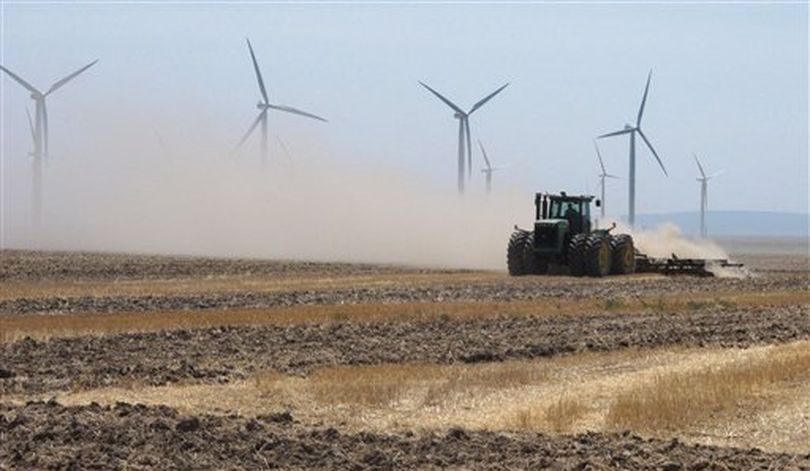Big PUC hearings next week to focus on future of renewables in Idaho

Big hearings at the Idaho Public Utilities Commission next week are expected to attract a crowd of lawyers, utility executives and environmentalists, the AP reports, as the PUC weighs how to set the course for Idaho's renewable energy industry for years to come. "These issues have been going on since 2005," said Gene Fadness, PUC spokesman. Commissioners "are more than ready to have all the parties come to some sort of agreement."
Among the points of dispute: How to set the price utilities must pay renewables developers for their power; whether utilities can refuse to buy power from alternative projects when relatively few people are using electricity; and who has the rights to lucrative environmental credits that accompany renewable energy projects - the utilities or the renewables developers. Click below for a full report from AP reporter John Miller.
Utilities, renewables developers set for PUC fight
By JOHN MILLER, Associated Press
BOISE, Idaho (AP) — State electricity regulators aiming to set the course for Idaho's renewables industry for years to come will hold hearings next week on long-running and bitter disputes between utilities like Idaho Power Co. and independent wind, solar and biogas developers.
The Idaho Public Utilities Commission has scheduled three days of hearings starting Tuesday, to be attended by a crowd of lawyers, utility executives and environmentalists.
Regulators hope to settle differences, including how to set the price utilities must pay renewables developers for their power and whether utilities can refuse to buy power from alternative projects when relatively few people are using electricity. There's also the vexing issue of whether lucrative environmental credits that accompany renewable energy projects should be the property of the utilities — or the independent developers.
"These issues have been going on since 2005," said Gene Fadness, the PUC spokesman. Commissioners "are more than ready to have all the parties come to some sort of agreement."
For most of the last decade, disputes between alternative power producers like Exergy Development Group, a Boise-based wind-power developer, and Idaho Power, Rocky Mountain Power and Avista, the three largest regional utilities, have turned the state's renewables landscape into a mine field of contention.
The utilities argue that wind producers like Exergy have abused a 1978 law known as Public Utility Regulatory Policies Act, or PURPA, to secure attractive contracts for their energy, driving up costs for ratepayers and making the energy supply less predictable and reliable.
Idaho Power argues that only by changing the formula that determines electricity rates utilities must pay independent producers — it's based on the price of natural gas — and limiting contracts to as few as five years, down from the customary 20, will ratepayers be protected.
"Certainly, it's significant for our customers, they're the ones ultimately paying for the electricity," said Brad Bowlin, an Idaho Power spokesman. "What we're really trying to do to with this is prevent further harm to our customers."
Exergy says its projects, which include more than 100 southern Idaho wind turbines, produce hundreds of jobs and millions in revenue for local governments. The company suggests that utilities really aim to cripple the renewables industry.
"Idaho Power's doomsday predictions are overblown and not supported by what few facts there are in this case," Exergy lawyers wrote earlier this year.
Utilities and independent developers also are fighting over who owns valuable renewable energy credits, or "RECs," that accompany alternative projects and can be sold to satisfy utilities' renewables requirements in states that have mandated them, including Oregon and Washington. In 2011, for example, Seattle City Light bought the RECs from a 22-megawatt Idaho wind farm for $1 million annually.
Utilities say they deserve them, but independent producers like Clearwater Paper Corp., with a 40-megawatt biomass electricity plant at its Lewiston mill, and J.R. Simplot, with a cogeneration facility at its Pocatello fertilizer factory that's seeking a new contract with Idaho Power, say utilities seek to take private property without paying for it.
"Where the government requires an owner to suffer a permanent physical invasion of their property... it must provide just compensation," Simplot and Clearwater Paper wrote last month in filings laying the groundwork for next week's hearings
However, an Idaho attorney general's legal brief filed on behalf of PUC staff concludes that the utilities have a legitimate claim to the credits. "The renewable status should remain with the energy purchased by the utility," wrote Kristine Sasser, the PUC's deputy attorney general.
Peter Richardson, a Boise-based energy attorney for Simplot, Clearwater Paper and Exergy, counters that giving the utilities what they want will shut down Idaho's renewables industry for years to come.
"If the commission adopts what the staff and utilities have recommended, we're back to building gas and coal plants to meet our future load," he predicts. "We all know the problems with coal, and gas prices are notoriously volatile. That's a really scary thing to put the ratepayers at risk to."
Decisions of such gravity should be reserved for the Legislature, Richardson added, not the three-member PUC.
The Idaho Legislature, however, has been reluctant to intervene, setting the stage for this week's hearings.
In the 2012 session, lawmakers rejected legislation sponsored by Idaho Power, Rocky Mountain Power and Avista to award them the RECs, leaving matters for regulators to decide.
Copyright 2012 The Associated Press.
